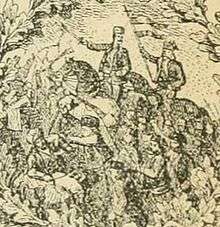Battle of Loznica
| Battle of Loznica | |||||||
|---|---|---|---|---|---|---|---|
| Part of First Serbian Uprising | |||||||
 | |||||||
| |||||||
| Belligerents | |||||||
| Serbian Revolutionaries | Ottoman Empire | ||||||
| Commanders and leaders | |||||||
|
Anta Bogićević Luka Lazarević Jakov Nenadović | Ali-paša Vidajić † | ||||||
| Strength | |||||||
| 1,200 | 30,000 | ||||||
| Casualties and losses | |||||||
| 121 dead, 178 wounded | three times higher | ||||||
The Battle of Loznica (Serbian Cyrillic: бој на Лозници) or Battle of Tičar (бој на Тичару) was fought on 17–18 October 1810 between the Serbian Revolutionaries and the Ottoman Army in Loznica, western Serbia. Around 30,000 Ottoman troops under the command of Ali-paša Vidajić descended the Drina river with boats to the Tičar field near Loznica. The fortified city walls were defended by 1,200 Serb rebels led by local vojvoda Anta Bogićević. Estimating that the defence would be unable to resist, Anta sought aid from Luka Lazarević. Karađorđe, learning of the planned siege, sent a letter to Petar Dobrnjac urging him to send reinforcements as soon as possible. Around 10,000 rebels, of the Šabac and Valjevo nahije under the command of Luka Lazarević and Jakov Nenadović arrived in time. The fight began in the morning, with two hours of swordfighting, and then shootouts with artilley and rifles, ending after eight hours in a Serbian victory. The Serbs had 121 dead and 178 wounded, while the Ottomans are said to have had three times higher casualties. Cincar-Janko was wounded in the battle. The blind guslar Filip Višnjić, who was present at the battle rallying the troops, wrote an epic poem of the battle, Boj na Loznici, recorded in the Šišatovac monastery in 1815.[1] The battle was one of the most important ones in the First Serbian Uprising.
References
- ↑ Svetozar Koljević (1998). Postanje epa. Srpska akademija nauka i umetnosti, Ogranak u Novom Sadu.
Тако у пјесми „Бој на Лозници", забиљеженој у манастиру Шишатовац у Срему 1815. године, гуслар Филип Вишњић приповиједа о опсади српског града у којем је, само пет година раније, он сам својом пјесмом бодрио устанике.
Sources
- Konstantin N. Nenadović (1903). Život i dela velikog Đorđa Petrovića Kara-Đorđa Vrhovnog Vožda, oslobodioca i Vladara Srbije i život njegovi Vojvoda i junaka: Kao gradivo za Srbsku Istoriju od godine 1804 do 1813 i na dalje. Sloboda.
Further reading
- Драган Добрић: Бој на Тичару (Историјски музеј Србије, Београд)